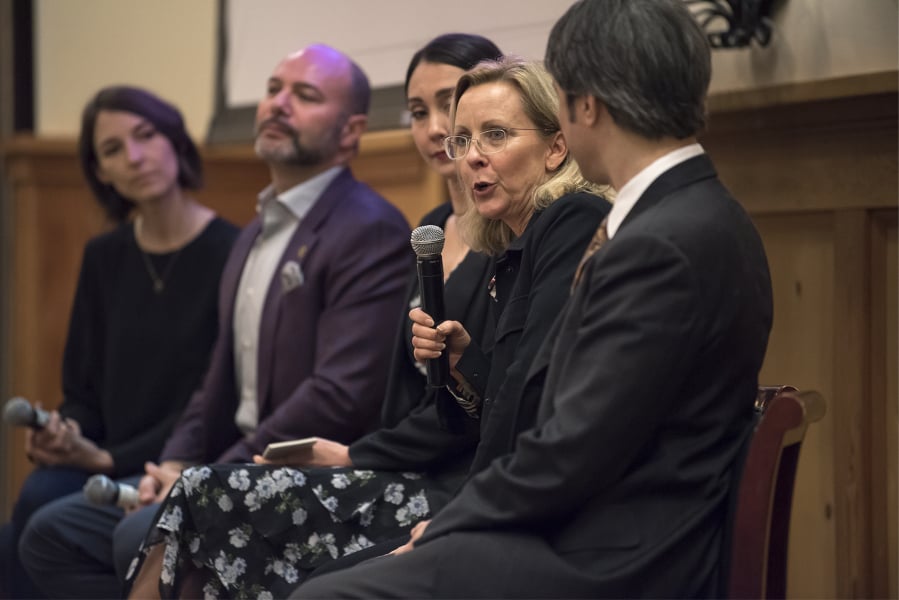Global trade opportunities — and trade turmoil caused by tariffs — were the central focus at the Columbia River Economic Development Council’s spring luncheon on Thursday. The theme for the event was “think global,” encouraging local business leaders to consider Clark County’s place in the global economy.
CREDC President Jennifer Baker led a discussion panel at the Heathman Lodge in Vancouver consisting of Slumberkins Marketing Director Vanessa Holfert, United Grain President and CEO Augusto Bassanini, U.S. Commercial Service senior international trade specialist Kellie Holloway and David Kohl, statewide international trade liaison for the Oregon Small Business Development Center Network.
Baker asked the panelists to discuss strategies for how local companies can make sure their products appeal to global markets, and the difficulties of making sure the area achieves global recognition — especially given that Vancouver shares a name with a city in Canada, Washington shares a name with the U.S. capital, and Clark County shares a name with 11 other U.S. counties.
Holloway and Kohl both talked about emphasizing the “undervalued” aspects of the Pacific Northwest such as the climate, lifestyle, and reputation for livability, and Kohl said that too many small businesses don’t take the leap to begin selling globally.
“These days it’s not as daunting as some people might think,” he said.
Holloway also said the Pacific Northwest is an excellent source of service industry products including new intellectual property.
“That’s an export too,” she said.
Bassanini noted that United Grain’s business model is heavily geared toward exports, and said the company maintains an edge against competitors in foreign markets thanks to the quality and reliability of their products.
In particular, he highlighted the popularity of western white wheat — a specific kind of wheat grown primarily in Oregon, Washington and Idaho — in Japan and other Asian markets. The Pacific Northwest also benefits from being the geographically closest producer to Japan, he said — although he cautioned that geography alone isn’t enough.
“It’s imperative to continue to keep up with infrastructure,” he said.
Holfert talked about the marketing approach for the Slumberkins books and plush dolls. A strong social media presence has helped the brand expand globally, she said, and the leaders are working to expand their wholesale and e-commerce efforts to keep up.
Slumberkins is also working with the Jim Henson Co. to develop a TV show featuring the characters that would air on streaming platforms, she said, furthering the global reach. She said the company is being careful to stay focused on its core concept, which is the relationship between children and their caregivers and emotional skill-building for kids.
“We need to make sure the educational point isn’t overridden by the entertainment,” she said.
The company also placed an early emphasis on filing the correct trademarks and securing its intellectual property, she said, which has proven to be an important foundation as the brand begins to expand globally.
Baker also asked the panelists about the advantages beyond jobs and exposure that companies can gain by tapping into global markets.
Holloway said that global companies are able to expand faster and are more readily able to ride out turbulent economic periods. One of the biggest advantages for food producers is global seasonality, she said, which allows producers to have more consistent production systems instead of having to ramp up at a specific times of year.
Baker asked about strategies in response to a current lack of predictability in U.S. trade policy, and Bassanini pointed to the need to find multiple export markets for products, citing his own company’s experiences with soybeans.
“Of all the trade disputes that are ongoing today, China is probably the one that has impacted our industry the most,” he said.
China is the world’s largest soybean importer, he said, and about 45 percent of its soybeans used to come from the United States.
But soybean exports to China have dropped by about 70 percent due to tariffs, he said, so United Grain had to find alternate export destinations such as Spain, Bangladesh and Vietnam.
The adjustments have worked in the short term, he said, but the long term concern in the industry is that China will begin looking for alternative soybean suppliers, making it more difficult for United Grain and other U.S. exporters to re-enter the Chinese market after the trade dispute is resolved.




